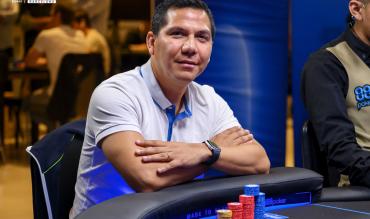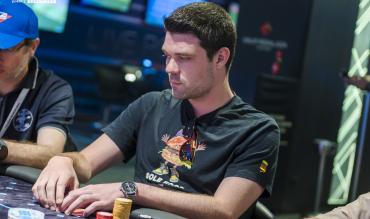I recently received a message from a fellow gamer who considers himself a part-time player with big dreams of going pro one day. He expressed concern about having limited time to devote to the game. He wondered how to level up his skills, given these constraints.
You might be in the same boat, with lofty ambitions but limited time. Don't worry; I've got your back! Here’s a short guide to help you maximise your time and achieve all your poker goals.
So, if you're ready to get started, let's dive in!
Step 1: Adopt a Professional Mindset
The first thing you should do is adopt a professional poker mindset. Approach the game with a serious, analytical attitude. View it as a profession rather than a hobby. It also means setting clear goals and developing a strategic plan for achieving them. And you should track your progress, adjusting your approach as needed.
One of the easiest ways to develop a professional mindset is with a psychological technique known as “acting as if”, developed and promoted by Alfred Adler.
Adler is a psychological theorist and practitioner. He believed that all healthy humans have an innate desire to overcome feelings of inferiority and strive for improvement.
One of the primary ways to do that is by “acting as if” you are who you always wanted to be.

“Acting as if” involves visualising yourself as a successful, confident, and competent poker player. Then you behave in a way that aligns with these characteristics.
Take a moment and imagine what your favourite professional poker player does on a daily basis to maintain their healthy winrate.
- What types of habits do you imagine that they have?
- How much time do they put into studying?
- What types of materials do they explore?
- How do they decide what to work on when they study?
- Do they eat a healthy diet? Exercise? Meditate?
Now take it a step further and behave as if you already possess the skills and habits of a successful pro. This stage could mean adopting the best players’ patterns, mindset, and decision-making strategies.
As you repeat these processes, you’ll gradually internalise these traits and make them a part of your identity. So even though my dear reader is limited on time, they are not limited in the ability to act as a pro-level player.
How about you?
If you decide to act as if you are a pro-level player, are there any changes that you need to make?

You may have less time to devote to the game and your professional study. But you can undoubtedly do many of the same things on a much smaller scale.
All you have to do is ask yourself:
“What would I be doing right now in this spot if I decided to adopt a pro-level identity?”
And then, do these things!
Step 2: Use an Efficient Study Plan
Adopting a “pro-level” identity and mindset will help improve your self-confidence and self-discipline. But it’s equally essential to create an efficient study plan to develop the technical skills to achieve your goals.
Developing your technical skills includes the following:
- Studying the game in depth
- Practising consistently
- Seeking out feedback and mentorship from more experienced players
- Refining your decision-making processes
- Learning to manage your emotions and bankroll effectively.
- Staying up-to-date with the latest trends and strategies in the poker world.
As you can see, this is a lot to work on when you're short on time. So, setting up your study schedule to be as efficient as possible is crucial.
To do that, you need to follow these guidelines:
- Establish clear areas for improvement: Identify what you want to learn and what specific skills you want to improve. For maximum efficiency, consider the spots that come up the most often and where your leaks are concerning those spots.
You’ll get better much faster by focusing on the 20% of things that will give you the 80% of your results.

These are your learning objectives. They are the measurable steps to achieving your goal. If you get hung up on this, think about what you’ll be able to do better or more effectively by the end of your study.
Also, it’s generally wise to work on improving one part of your game at a time. Otherwise, it can get too overwhelming!
- Set your goals and objectives: Once you have established your areas for improvement, it’s time to set your learning goals:
These are your learning objectives. They are the measurable steps to achieving your goal. If you get hung up on this, think about what you’ll be able to do better or more effectively by the end of your study.
Also, it’s generally wise to work on improving one part of your game at a time. Otherwise, it can get too overwhelming!
- What outcome do you specifically want to have to improve your game?
- How exactly will you achieve this outcome?
- Select the best learning materials: Many resources are available to help improve your game, including books, online courses, training sites, and forums. It's crucial to choose materials that are directly related to your learning goals and objectives.
It’s usually a mistake to bounce around from topic to topic. If you want to improve your play from the big blind, for example, create a list of possible resources on that topic alone. Make a list for later if you find interesting materials on other topics.
- Estimate how long it will take and set milestones and deadlines:
- How long will it take for you to achieve your learning goal?
- How much time do you have available for study?

- Create a weekly schedule: Once you know your deadlines and milestones, it’s pretty simple to make a weekly schedule. Don’t forget to include all goal-related activities, like coaching sessions, videos to watch, solver analyses, discussions with friends, etc.
- Review and reflect: Apply what you’re learning in your study plan by playing regularly and analysing your play. This step could include reviewing hand histories or tracking results to identify further areas for improvement. It’s okay if things are taking longer than expected. Revise your deadline and continue on the path.
Don’t forget to get feedback, which is crucial to improving at poker. Find a mentor or coach or join a study group or forum to get input on identifying more areas for improvement.
- Continuously assess and adjust: As you progress in your study plan and improve your game, continuously assess your progress and adjust accordingly. Set new goals and objectives as you improve. Continue to challenge yourself to reach new levels of skill and understanding.
These steps will help you set up an efficient study plan to improve your game and move up in stakes quickly. Poker improvement is a never-ending process, so you'll repeat this learning cycle many times in your journey!
Step 3: Stay Motivated and Focused
It's essential to stay motivated and focused on your poker goals:
- Stay positive, even in the face of setbacks or challenges.
- Staying disciplined and consistent in your approach is the epitome of a professional mindset.
The best way to stay motivated and focused is to remind yourself of your progress. Set up a simple tracking system to monitor the progress you’re making.

We, humans, are motivated by progress. So, even a slight movement towards our goals can inspire us to go for more.
Finally, seek out inspiration and mentorship from successful players. Build a community of like-minded individuals who can support and motivate you.
Getting good at poker (and possibly going pro) takes much longer and is much longer than players expect. A support system can make all the difference in reaching your goals!
Part-time Players’ Guide - Conclusion
When you’re a part-time player, it can seem like there is never enough time to play and study all the materials you’ve found.
Whether you want to remain a recreational player or go pro, it’s critical to remember that there is a process for getting better. It all starts with the identity you want for yourself and your willingness to make your preferred identity a reality.
If you have that and follow the steps laid out for you here, you will achieve results!


